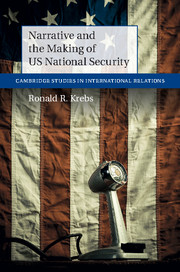Book contents
- Frontmatter
- Dedication
- Contents
- List of figures
- List of tables
- Acknowledgments
- 1 Narrating national security
- PART I Crisis, authority, and rhetorical mode: the fate of narrative projects, from the battle against isolationism to the War on Terror
- PART II Narrative at war: politics and rhetorical strategy in the military crucible, from Korea to Iraq
- Conclusion
- Appendices
- References
- Index
- Cambridge Studies in International Relations
1 - Narrating national security
Published online by Cambridge University Press: 05 December 2015
- Frontmatter
- Dedication
- Contents
- List of figures
- List of tables
- Acknowledgments
- 1 Narrating national security
- PART I Crisis, authority, and rhetorical mode: the fate of narrative projects, from the battle against isolationism to the War on Terror
- PART II Narrative at war: politics and rhetorical strategy in the military crucible, from Korea to Iraq
- Conclusion
- Appendices
- References
- Index
- Cambridge Studies in International Relations
Summary
In the winter of 2007, as Americans grew increasingly weary of a protracted and seemingly unwinnable war in Iraq, President George W. Bush bucked the political winds and, rather than bring the troops home, called for dispatching more forces, a “surge.” This would be a last-ditch effort to bring order to Iraq, which had known little peace since US forces had invaded the country and toppled Saddam Hussein's regime four years before. But, while the military struggled to dominate the battlefield in Iraq, Bush faced a rhetorical insurgency at home. This was not a surge, many Democrats warned, but a dangerous “escalation.” Failing to back the surge was tantamount to capitulating to “Jihadist Joe,” one Republican congressman memorably charged. Democratic opponents countered that resisting the surge was the surest way to save “GI Joe.” Where the administration saw controllable “sectarian strife,” many Democrats saw an unmanageable “civil war.” There was a lot at stake in these rhetorical battles. Both sides believed that, with their patience wearing thin, Americans wanted nothing to do with someone else's “civil war.” Sectarian or civil “strife,” though, seemed like a law-and-order problem, just the sort of thing that well-meaning outsiders could help to quash.
Such familiar rhetorical contests shape the course of politics, even in matters of national security. That is hardly news to politicians the world over, who spend untold sums on staff and consultants to help them craft their messages. It would not surprise generations of scholars across the humanities and social sciences who have labored to reveal language's inner workings and contradictions, its relationship to human cognition and experience, and its deep structures, and to catalog the techniques of rhetorical mastery. Yet, it would come as news to many scholars of politics, especially of foreign policy and international relations, who often dismiss “mere” rhetoric as posturing and as unworthy of analysis. This book sides with the politicians – not because the world of politics is a genteel debating society, whose participants politely puzzle over the central issues of the day, but because it is not. In politics, language is a crucial medium, means, locus, and object of contest. It neither competes with nor complements power politics: it is power politics. Through language, actors exercise influence over others' behavior. Through language, political subjects are produced and social relations defined.
- Type
- Chapter
- Information
- Narrative and the Making of US National Security , pp. 1 - 28Publisher: Cambridge University PressPrint publication year: 2015

